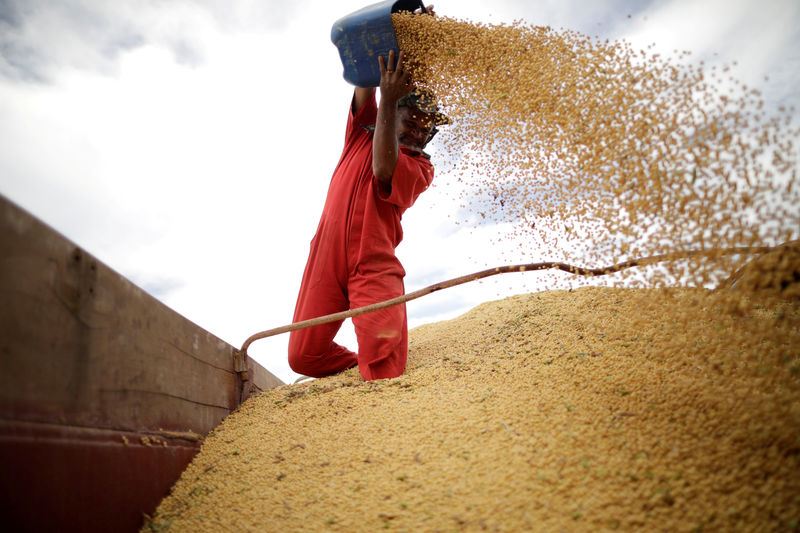BEIJING (Reuters) - China will need to drop steep tariffs it imposed on a range of American farm products earlier this year before it can fulfill its pledge to buy substantial volumes of U.S. goods, said Chinese traders on Monday.
China and the United States agreed on Saturday to a ceasefire in a months-long trade war that has roiled global markets and halted sales of U.S. soybeans to the world's top buyer.
The United States agreed to put on hold a scheduled increase in tariffs on $200 billion of Chinese goods due to come into effect on Jan. 1, following talks between U.S. President Donald Trump and Chinese President Xi Jinping at a gathering of world leaders in Argentina.
The White House said Beijing had promised to buy an unspecified but "very substantial" amount of agricultural, energy, industrial and other products, with purchases of farm goods to start "immediately."
But no substantial purchases can happen with a 25 percent duty still in place on U.S. soybeans, corn, sorghum and wheat, said buyers and analysts.
"How can you buy U.S. products if China does not reduce the tariffs? We haven't made any move yet," said a trader with a major Chinese trading house. He declined to be identified as he was not allowed to be quoted by media.
China's tariffs on U.S. soybeans mean they are $60 per tonne more expensive than those from top global supplier Brazil, which is due to begin harvesting a record crop in a few weeks time.
(Graphic: U.S. soybean export prices more than $60/tonne above Brazil's due to 25 pct tariff - https://tmsnrt.rs/2RCfN7C)
Muted reaction in both the Chicago and Dalian futures markets on Monday underlined the lack of incentives for new purchases. [GRA/]
Chicago Board of Trade soybeans settled up about 1 percent while Dalian soymeal futures closed down less than 1.4 percent.
"The market isn't impressed," said Darin Friedrichs, Shanghai-based consultant at INTL FCStone.
REMOVING TARIFFS?
Some industry participants expected China to drop the tariffs soon after the Trump-Xi meeting.
"Tariffs on U.S. soybeans might drop as the two sides enter a honeymoon period. It is expected that they will start sending out goodwill signals," said Tian Hao, senior analyst with First Futures.
China's foreign ministry said on Monday that the two presidents had instructed their economic teams to work towards removing all tariffs.
"China has to do this, basically to get room to breathe," said an executive at a state-owned trading house.
Until then, the only buyers likely to make purchases of pricey U.S. grain will be state-owned enterprises instructed by Beijing to buy soybeans for state reserves.
"If they have to buy something, then they can ask (state stockpiler) Sinograin to buy, the tariff is OK for reserves," said another China-based trader with a global trading firm.
Time is running out for the United States to ship soy before Brazilian farmers start their harvest, U.S. analysts said.
"It takes time to get up and running again," said Mike Steenhoek, executive director of the Iowa-based Soy Transportation Coalition.
Soybeans would need to be transported by rail from the interior Midwest to Pacific Northwest ports, where some export facilities may have already booked space for other grains, Steenhoek said. Shipment to China takes about three weeks.
"The window of doing bean business to China is getting really skinny, almost to the point where it is closed," said Roy Huckabay, of Linn and Associates, a Chicago brokerage.

(Graphic: Soybeans are by far China's top agriculture import from the United States - https://tmsnrt.rs/2Q6pFdn)